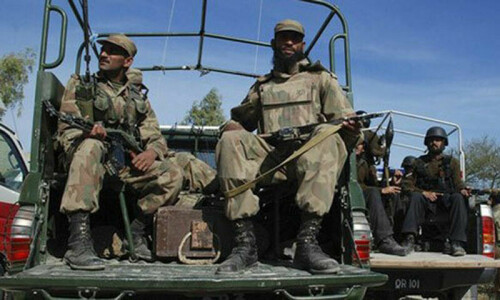ISLAMABAD: Pakistan’s Special Representative on Afghanistan Asif Ali Durrani has regretted that the TTP attacks in Pakistan emanating from Afghanistan have significantly increased since the Afghan Taliban took over Kabul.
Speaking at a seminar on ‘The Challenge of Cross-Border Terrorism’ organised by the Institute of Regional Studies (IRS), Mr Durrani said peace in Afghanistan seemed a tall order for now and, therefore, they would have to live with the neighbouring country and manage the affairs with Afghanistan accordingly.
“Earlier, it was hoped that with the arrival of the Taliban, the security situation on the Pak-Afghan border would improve but unfortunately the attacks emanating from Afghanistan had increased by 60pc in the last two years,” said Mr Durrani, according to a press release issued here on Friday.
Says there should be no talks with non-state actors
Regarding Indian involvement in fomenting terrorism, he stated, “I have no qualms in saying that Indians are paying the Tehreek-i-Taliban Pakistan (TTP) through the Afghan proxies, and it is not something new as Indians have been propping up the TTP since the Karzai government.”
Mr Durrani emphasised that the state should not negotiate with non-state actors.
Speaking on the occasion, former National Security Advisor (NSA) retired Lt-Gen Nasir Khan Janjua suggested that the way forward to deal with the challenge of cross-border terrorism, especially the TTP, was to proceed through the Afghan government.
Mr Janjua also underscored that for a better future, and ensuring a better partnership in the development of the region, they needed to look at Afghanistan beyond the TTP factor.
He also emphasised the need to see cross-border terrorism threat in a larger canvas, adding that “today’s challenges were direct outcome of the conflicting ideologies of different countries and their maneuverings with the insurgent groups.”
Sharing his thoughts on the occasion, Dr Kaleem Imam, former IGP and counter-terrorism expert, said besides the TTP, several other militant organisations were actively involved in spreading insurgencies such as the BLA and BLF.
He suggested that for countering each of these groups different strategies were required as one model could not apply to all, given the complex nature of militant networks and their ideologies.
A renowned author and journalist, Zahid Hussain, said what was happening after the return of the Taliban was not something surprising as it had been predicted well in time, “but we were not prepared for it”.
He underpinned that “it is not possible for the TTP to stay in Afghanistan without the support of the Afghan Taliban” and regretted that an incoherent approach had led to the failure of the state in countering the existential threat of terrorism. He also impressed upon the need for clarity in policies towards TTP since “fighting and negotiation could not go side by side”.
Published in Dawn, May 11th, 2024














































Dear visitor, the comments section is undergoing an overhaul and will return soon.